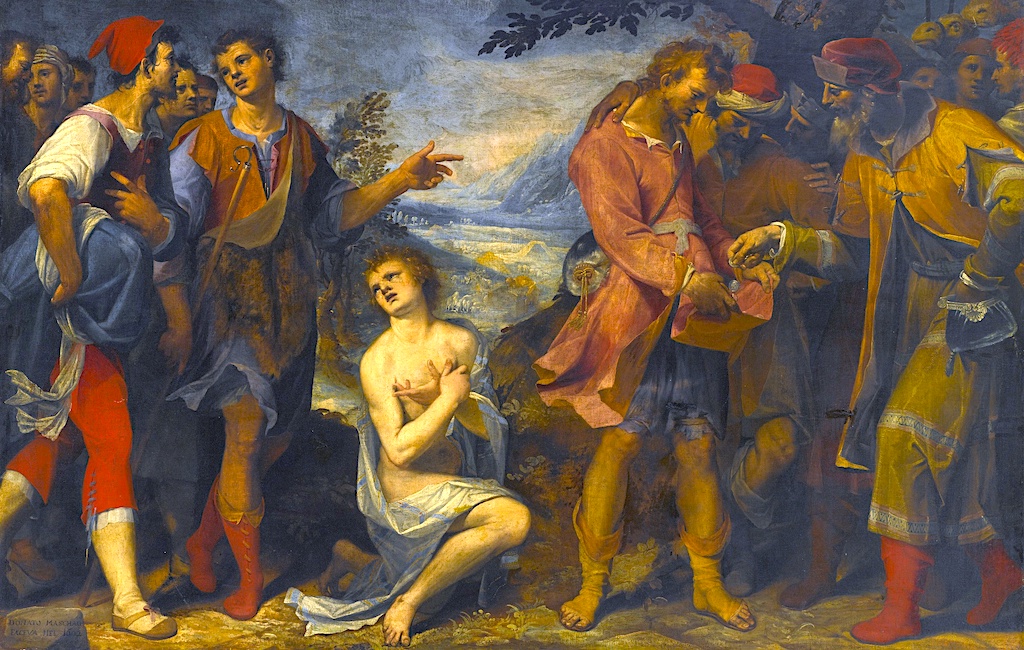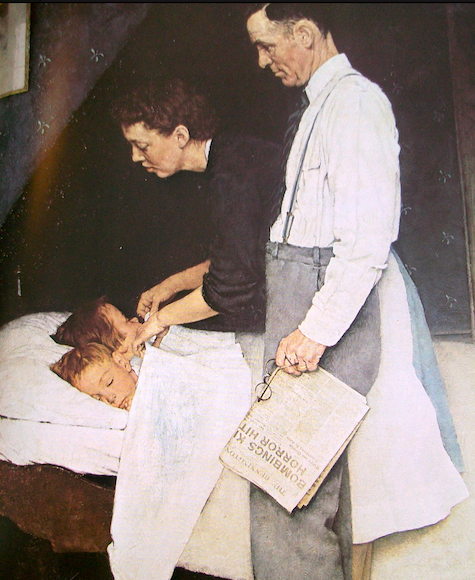What Men Intend for Evil

Do you ever tire of living with uncertainty? Do you grow weary of praying for justice? Or get disheartened when you see the wicked prevail? Whether you are observing a divisive political contest or fighting a more personal battle, take courage! God has a long history of preempting what men intend for evil and orchestrating it for good. (Genesis 50:20)
For the LORD is sovereign over the affairs of man. (Daniel 4:17) Nefarious schemes never take Him by surprise. (Job 34:21-22) Rather, whatever evil has been plotted against us, He uses to strengthen our faith (James 1:2-3), deepen our dependence on Him (Psalm 55:22), conform us to the image of Christ (Romans 8:28-29), and enable us to stand boldly for what is right. (Acts 4:29)
The poem I’ve written and recorded below highlights many such instances of God’s turning the tables in this fashion. He’s done it before, and is fully capable of doing it again. So when you take your present burdens to the foot of the cross, pray expectantly.
What Men Intend for Evil
Through all of time, a battle’s raged
Between two schools of thought:
The wicked do just as they please,
The righteous, as they ought.
But even when our foes don’t fight
As fairly as they should,
We know what men intend for evil
God designs for good.
When Joseph’s jealous brothers schemed
And sold him as a slave,
They meant him harm, but Joseph knew
His trials were God-ordained.
Had Potiphar not bought him,
Had his wife not cast her eyes
On Joseph, he’d have not been jailed,
Indicted by her lies.
And had he not in prison been
To hear his cell mates’ dreams
Then Joseph never would’ve garnered
Pharaoh’s high esteem,
Who tested and appointed him
As second in command
To keep the coming famine from
Destroying life and land.
When Moses, as a child, was raised
In Pharaoh’s royal court,
The circumstance that brought him there
Was of the vilest sort.
For countless other babies died
While he alone was spared
And set apart by God’s strong hand
To do as He declared.
Yet Pharaoh hardened fast his heart
And stubbornly refused
To free God’s people, till their chains
The Lord Himself unloosed.
The plagues of Egypt failed to open
Pharaoh’s blinded eyes;
Instead his evil threats just served
To hasten his demise.
It wasn’t right when Babylon
Took Daniel and his friends
So far from home and kin they loved
To live in distant lands.
When in the lions’ den and
Fiery furnace they were thrown,
The Angel of the Lord was there
To make God’s glory known.
When Esther was commended for
Her beauty to the King
And taken for his harem, then
Eventually crowned queen,
She knew “for such a time as this”
’Twas God who placed her there
To foil the wicked Haman’s plot
Through urgent pleas and prayer.
Then, at the height of all injustice,
Christ was crucified,
Yet God’s redemptive plans all hinged
Upon the fact He died.
Without the cross, without the grave
From which He rose again,
The world He loved and came to save
Would perish in its sin.
Doubtlessly, the devil thought
He’d won when Christ was slain,
For little did he understand
The depth of God’s great plan.
He fancied he was in control,
But he misunderstood—
What Satan meant for evil,
God Himself decreed for good.
And so today, as in the past,
The Lord is on His throne,
He’s unperplexed by wicked schemes
Our enemies have sown.
May history show, when foes conspired,
That on this truth I stood:
What men intend for evil,
God will always use for good.
— Jennifer Flanders
Bear in mind as you read through the Biblical accounts of Joseph, Moses, Esther, Daniel and his friends, that we have the privilege of knowing right away how things turned out in the end. But for them, in the moment? They had no idea how or when God would move to change their circumstances. Yet they clung to the knowledge that God is faithful. Which is what Christians today are likewise called to do. (Hebrews 10:23-25)
God’s Timing is Perfect
That’s a big deal. Because God’s redemption of the evil plotted against His people seldom comes instantaneously. Many times, the difficult circumstances aren’t resolved until weeks or months or years or decades later.
Joseph
Joseph labored in Potiphar’s house 11 years before going to jail. He languished in prison for two more years after that. He was 17 when his brothers sold him into slavery and 30 when Pharaoh made him governor. More than twenty years passed before he ever saw his father or brothers again — and his mother died in the interim. (Genesis 37, 39-45)
Moses
God set Moses apart at birth, but he was in his 80s when the LORD finally sent him to deliver the Israelites out of their bondage in Egypt, and he faced many refusals before Pharaoh finally acquiesced. (Exodus 1-14)
Daniel
Daniel was still in his teens, possibly even younger, when he was taken as a captive to Babylon. After gaining renown for his wisdom and insight and his ability to interpret dreams (for which he gave all glory to God), he served as a government official under four different kings spanning more than 70 years, despite some vicious opposition. That night he spent in the lion’s den? Daniel was likely in his 80s when that was orchestrated by his political opponents. Yet Daniel’s life was spared, and his enemies lives were forfeited to the same fate they’d sought to impose on him. (Daniel 1-2, 4-6)
Daniel’s Friends
Shadrach, Meshach, and Abednego, the friends who were taken into captivity with Daniel, summed up their perspective on God’s sovereignty thus: “If we are thrown into the blazing furnace, the God we serve is able to deliver us from it, and he will deliver us from Your Majesty’s hand. But even if he does not, we want you to know, Your Majesty, that we will not serve your gods or worship the image of gold you have set up.” (Daniel 3:17-18) They were confident God could deliver them, but did not know in advance whether He would. Yet, reading on, we see their faith was not misplaced. Though they were bound and thrown into a furnace so hot it slew the men stoking the fires, these three could be clearly seen walking alongside a fourth figure in the midst of the flames, and when they were at last called forth, they emerged unharmed. Not a hair of their head had been singed, nor did their clothes even smell of smoke. (Daniel 3)
Esther
Esther’s presence in the royal court providentially coincided with a very wicked scheme concocted by the antisemitic Haman. He’d pushed through a law that allowed the favored class to attack, loot, and murder God’s chosen people with impunity. But Esther recognized the importance of fasting, prayer, and a humble appeal through legal channels — all of which God used to thwart Haman’s plans and catch him in his own trap. (Esther 2-8)
Jesus
Of course, the crucifixion of Jesus, who knew no sin, stands as the ultimate example of how, sometimes, a gross miscarriage of justice is exactly what God prescribes to further His plan. It was wrong to the core for an innocent man to be killed on the false testimony of liars and cheats. But it was the boundless mercy of God that allowed it, as Acts 4:27-28 makes clear: “Herod and Pontius Pilate conspired with the Gentiles and the people of Israel against Your holy servant Jesus, whom You anointed. They carried out what Your hand and will had decided beforehand would happen.”
The take-home message from all of this? Keep the faith! Be persistent in prayer! Rest assured that what men intend for evil, God will use for good.
We can’t know the future, but we can know the One who holds it in His hands. He may use legal action, political reform, social movements, or a host of other strategies to accomplish His will, but our hope must rest fully in Christ and Christ alone.
Let’s continue to affirm His goodness. Let’s be careful to speak only the truth in love. And let’s faithfully do everything we can to serve as salt and light in our families, communities, and world, all the time trusting not in our own efforts, but in the God who empowers us to perform them.







My adult child has been in a difficult situation for a long time. The situation has forced me to search for truth and God is opening my eyes to truths in scripture. I want to say, “Thank you!” for sharing this article.
You are so welcome. I’m sorry to hear about your child’s difficulties, but am grateful to think the trial has prompted you to dig deeper into God’s Word and that you’ve found strength and comfort there. I pray it will do the same for your adult child.
Thank you so much for your blog.
I appreciate the comments and encouragement within.
Blessings and peace.
You’re so welcome, Hyacinth. Blessings to you, as well!